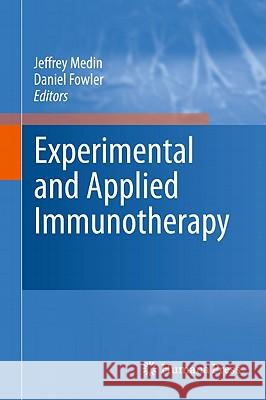Experimental and Applied Immunotherapy » książka



Experimental and Applied Immunotherapy
ISBN-13: 9781607619796 / Angielski / Twarda / 2010 / 442 str.
Experimental and Applied Immunotherapy
ISBN-13: 9781607619796 / Angielski / Twarda / 2010 / 442 str.
(netto: 768,56 VAT: 5%)
Najniższa cena z 30 dni: 771,08
ok. 16-18 dni roboczych.
Darmowa dostawa!
Experimental and Applied Immunotherapy offers a roadmap to the creation of immunotherapies, which have prominent cancer-fighting potential. Readers will find discussions of T cell and non-T cell therapy, monoclonal antibody therapy, dendritic cell-based cancer vaccines, and more.
From the reviews:
"The text is divided into five parts, each comprising of one or more chapters written by word-renowned scientists in the field. ... the editors have made an excellent effort to incorporate most relevant topics on immunotherapy in this textbook, and most chapters have been well written with supporting diagrams and tables. The text provides researchers in the field with up-to-date concepts and detailed current and future strategies for cancer immunotherapy." (Ali Roghanian, Immunology News, May, 2012)
"Cancer immunotherapy is a vast area of research and it is covered in some depth by this very informative book. Each of the 19 chapters consists of a quick introduction to the specific area of interest of one of the contributors followed by in-depth analysis of experimental techniques currently being used successfully, or otherwise, in the field. ... Overall, an enlightening book that covers a variety of immunotherapy techniques, but the book is directed specifically at those interested in cancer treatment." (Donal Wall, Microbiology Today, November, 2011)
"A highly informative compendium of essays with a heavy focus on cancer immunotherapy. ... the essays are excellent and present the state of the art of many emerging and established immunotherapies for cancer. ... Immunisation approaches are considered by several authors. ... I can recommend this excellent collection of succinct essays that span the breath of ongoing research in cancer immunotherapy." (British Journal of Clinical Pharmacology, May, 2011)
Foreword, by Carl H. June, M.D.
I T Cell Therapy: State-of-the-Art
Chapter 1: Extending the Use of Adoptive T Cell Immunotherapy for Infections and Cancer, by Ulrike Gerdemann and Malcolm K. Brenner
II Non-T Cell Therapeutic Approaches
Chapter 2: B Lymphocytes in Cancer Immunology, by David Spaner
Chapter 3: Monoclonal Antibody Therapy for Cancer, by Christoph Rader
Chapter 4: Natural Killer Cells for Cancer Immunotherapy, by Yoko Kosaka and Armand Keating
Chapter 5: Dendritic Cell Based Cancer Vaccines: Practical Considerations, by Elizabeth Scheid, Michael Ricci, and Ronan Foley
Chapter 6: Mesenchymal Stromal Cells: an Emerging Cell-based Pharmaceutical, by Moïra François and Jacques Galipeau
III T Cell Therapeutic Approaches
Chapter 7: Tumor-specific Mutations as Targets for Cancer Immunotherapy, by Brad H. Nelson, John R. Webb
Chapter 8: Counteracting Subversion of MHC Class II Antigen Presentation by Tumors, by Jacques Thibodeau, Marie-Claude Bourgeois-Daigneault, and Réjean Lapointe
Chapter 9: Mechanisms and Implications of Immunodominance in CD8+ T-Cell Responses, by Claude Perreault
Chapter 10: T Regulatory Cells and Cancer Immunotherapy, by Adele Y. Wang and Megan K. Levings
Chapter 11: Negative Regulators in Cancer Immunology and Immunotherapy, by Wolfgang Zimmermann and Robert Kammerer
Chapter 12: Genetically Engineered Antigen Specificity in T Cells for Adoptive Immunotherapy, by Daniel J. Powell Jr. and Bruce L. Levine
IV Non-Cellular Aspects of Cancer Immunotherapy
Chapter 13: Cytokine Immunotherapy, by Megan Nelles, Vincenzo Salerno, Yixin Xu, and Christopher J. Paige
Chapter 14: Transcriptional Modulation using Histone Deacetylase Inhibitors for Cancer Immunotherapy, by Takashi Murakami
Chapter 15: Combining Cancer Vaccines with Conventional Therapies, by Natalie Grinshtein and Jonathan Bramson
Chapter 16: Combining Oncolytic Viruses with Cancer Immunotherapy, by
Kyle Stephenson, John Bell, and Brian Lichty
Chapter 17: Radiation Therapy and Cancer Treatment: From the Basics
to Combination Therapies that Ignite Immunity, by David A. Jaffray, and Jeffrey A. Medin Chapter 18: Assessing Immunotherapy through Cellular and Molecular Imaging, by John W. Barrett, Bryan Au, Ryan Buensuceso, Sonali de Chickera, Vasiliki Economopoulos, Paula Foster, and Gregory A. Dekaban
V Transplantation
Chapter 19: Converging Themes in Allogeneic and Autologous Transplantation, by Daniel Fowler
Immunotherapy is now recognized as an essential component of treatment for a wide variety of cancers. It is an interdisciplinary field that is critically dependent upon an improved understanding of a vast network of cross-regulatory cellular populations and a diversity of molecular effectors; it is a leading example of translational medicine with a favorable concept-to-clinical-trial timeframe of just a few years. There are many established immunotherapies already in existence, but there are exciting new cancer immunotherapies just on the horizon, which are likely to be more potent, less toxic and more cost effective than many therapies currently in use. Experimental and Applied Immunotherapy is a state-of-the-art text offering a roadmap leading to the creation of these future cancer-fighting immunotherapies. It includes essays by leading researchers that cover a wide variety of topics including T cell and non-T cell therapy, monoclonal antibody therapy, dendritic cell-based cancer vaccines, mesenchymal stromal cells, negative regulators in cancer immunology and immunotherapy, non-cellular aspects of cancer immunotherapy, the combining of cancer vaccines with conventional therapies, the combining of oncolytic viruses with cancer immunotherapy, transplantation, and more. The field of immunotherapy holds great promise that will soon come to fruition if creative investigators can bridge seemingly disparate disciplines, such as T cell therapy, gene therapy, and transplantation therapy. This text is a vital tool in the building of that bridge.
1997-2026 DolnySlask.com Agencja Internetowa
KrainaKsiazek.PL - Księgarnia Internetowa









